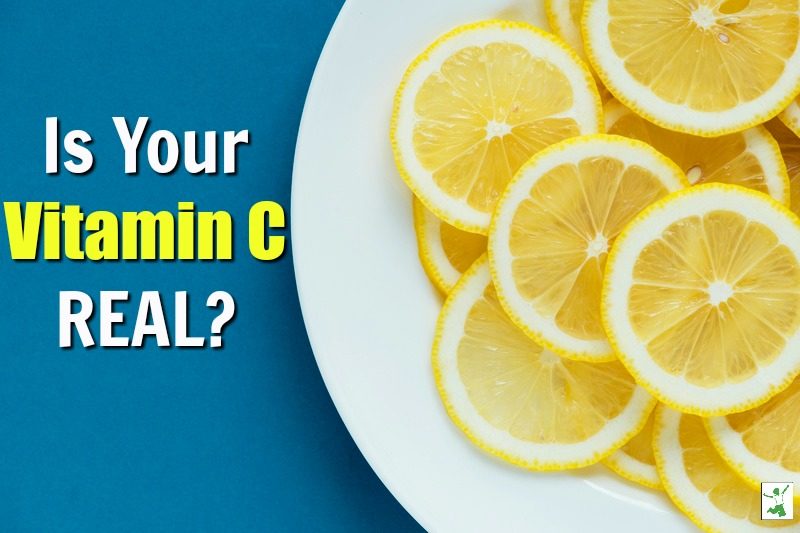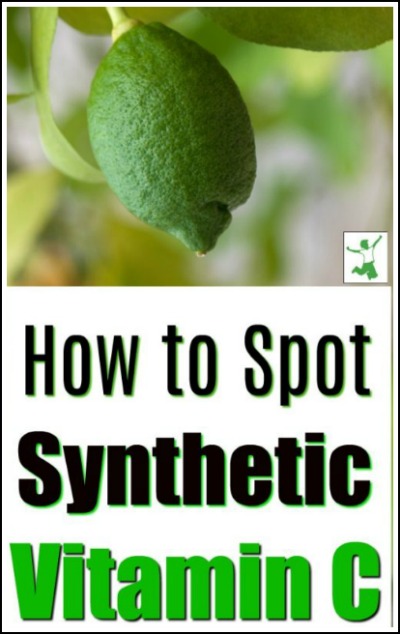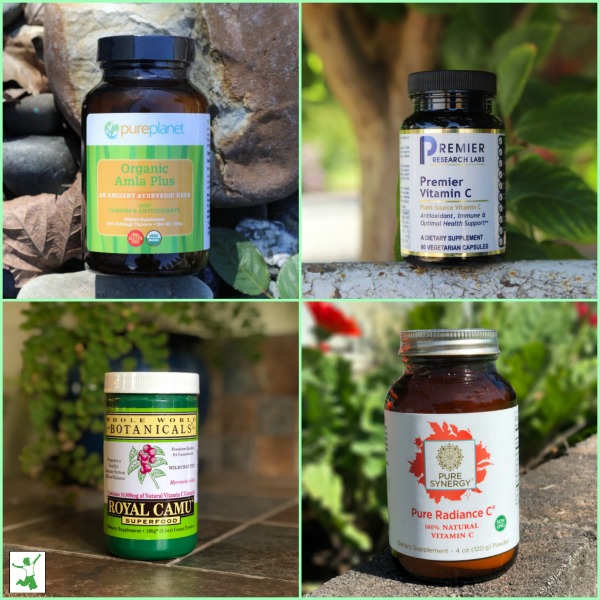Table of Contents[Hide][Show]

Did you know that ascorbic acid is actually synthetic vitamin C? What’s more, it is usually GMO vitamin C, which means it was derived from GMO corn.
If you are learning this for the first time, it can be a rather shocking realization as almost all vitamin C supplements on the market use isolated ascorbic acid separated from a whole food source. The manufacturing process that produces synthetically derived vitamin C leaves all the beneficial co-factors behind!
Even more disturbing, ascorbic acid is frequently marketed as natural vitamin C and added to organic foods as a natural preservative. Truly natural forms of vitamin C and synthetic ascorbic acid seem to be used interchangeably.
How confusing for the consumer!
Nearly all juices and fruit products are loaded up with ascorbic acid, even many organic, healthfood store versions. It seems that if a product is labeled “high in Vitamin C”, consumers buy more of it.
A lot of folks are being fooled by these misleading semantics. There is a growing body of evidence that those consuming high doses of ascorbic acid should have reason to worry.
Three Studies Suggest Caution with High Dose Ascorbic Acid
The journal Wise Traditions cites three studies that give pause about large doses of vitamin C. The first, from the Jun 15, 2001 issue of Science, showed that “synthetic vitamin C may contribute to the formation of genotoxins that can lead to cancer”.
A second study presented to the American Heart Association showed a link between consumption of only 500 mg of vitamin C per day and a greater propensity toward thickening of the arteries (Los Angeles Times, March 3, 2000).
More recently, athletes taking 1000 mg of isolated ascorbic acid per day showed reduced endurance capacity from interference with antioxidant enzymes (American Journal of Clinical Nutrition, Jan 2008).
This information should give pause to anyone who is actively taking synthetic vitamin C supplements such as those Emergen-C packets that are available everywhere, from pharmacies and health food stores to even gas stations!
Supplements like these are NOT boosting immunity and are NOT good for you!
Synthetic vitamins such as ascorbic acid act more like drugs in the body rather than whole food nutrients with all the available co-factors. Taking any synthetic vitamin can cause imbalances in the body and should be avoided.
Another worrisome and popular trend is the recommendation of some alternative health professionals to do a “vitamin C flush” during illness. This therapy (if you can call it that) calls for large doses of ascorbic acid until the onset of diarrhea.
This approach to regaining wellness has never made any sense to me. Now, with more studies indicating the danger of high doses of vitamin C, caution seems well-founded.
Fan of Linus Pauling? Consider This…
If you are a fan of Linus Pauling who popularized the notion of huge doses of Vitamin C for the common cold in the 1970s, consider this. GMO Vitamin C did not exist when Pauling was conducting his studies. GMO derived Vitamin C is what most people are unwittingly taking today!
What’s more, the studies indicating the danger of high doses of vitamin C over long periods of time had not been done yet. They were conducted long after Pauling died in 1994.
What about High Dose, Intravenous Ascorbic Acid?
What about high dose, intravenous ascorbic acid for the very ill? Note that vitamin C for IV use is almost always derived from GMO corn as well as being extremely high dose and synthetic ascorbic acid only.
Under certain circumstances and for the very ill, high dose GMO ascorbic acid therapy can be beneficial. For example, my husband used IV ascorbic acid therapy immediately after each amalgam removal. This prevented any released mercury from getting stored in the tissues. Not doing this risks the development of autoimmune disease.
However, synthetic vitamin C especially when genetically modified shouldn’t be a regular feature in anyone’s diet or supplement regimen.

Whole Food Vitamin C is Naturally Low Dose
The best way to get vitamin C on a daily basis is from whole foods sources. This will provide you this critical nutrient at a low dosage that will do no harm over the long term.
When you get the whole foods version of vitamin C, you don’t need much at all. A truly natural vitamin C supplement with no isolated ascorbic acid is naturally low-dose and yet highly effective.
Don’t forget about the benefits of fresh grassfed milk – a great source of vitamin C. The vitamin C in milk is mostly destroyed by pasteurization, along with many other nutrients. This is why buying fresh and local is so important.
Fresh and lacto-fermented fruits and vegetables (such as traditional sauerkraut) are other excellent sources of the whole vitamin C complex.
Perhaps folks feel the need to take large doses of synthetic vitamin C because all the processed foods they are eating are so devoid of the nutrient in its whole form. Switching to whole foods and dumping those vitamin C supplements in the trash would be a much better approach to boosting immunity!
Ascorbic Acid is Usually from Genetically Modified Corn
What’s worse is that ascorbic acid is not just synthetic. Remember that it is also usually derived from genetically modified corn! More on that GMO vitamin C travesty fooling millions of consumers every single day in the linked article.
Another vitamin scam harming consumers concerns synthetic folate commercially known as folic acid.
The pushing of beta carotene as true vitamin A by food manufacturers and supplement companies is another nutritional falsehood scamming millions of consumers and worse, seriously harming their health.
What to Look for in a True Vitamin C Product
To give you some idea of what to look for in a vitamin C supplement, here are the ingredients of the one I use. Notice that there is no isolated ascorbic acid or other ascorbates and no additives. Just pure food Vitamin C sources. Please note that this is not the only Vitamin C supplement that qualifies as totally pure. There are a few others.
Pure Radiance C ingredients: camu camu berry extract, manioc root, acerola berry extract, amla berry extract, buckwheat sprouts, freeze-dried berry blend, blueberry, raspberry, cranberry, cherry, rose hips fruit, lemon peel, black pepper berry extract.
I also use the Amla C Plus. Here are the ingredients: Organic Amla berry, organic spirulina.
Notice that the words “ascorbic acid” are not listed in either of these products!
Want to know where to find a complete line of whole food Vitamin C supplements from a variety of whole food plant sources?
Click here for several carefully vetted brands to choose from.









I’ve started taking Camu Camu. Natural HUGE doses of Vit C. Makes you feel great!!! IT offers advantages other than just Vit C as well.
I’ve tried and tried to convince even my most naturally-minded friends that synthetic vitamin C is harmful to health. I encourage rose hips (capsules and tea) and eating high vitamin C organic foods, such as bell peppers, dark leafy greens, kiwis, oranges and strawberries. Thanks so much for bringing this to people’s attention! 🙂
the Emergen C drink helps me get rid of colds and sickness quickly and feel better. Is that synthetic? Whatever it is feels good and works well and I haven’t seen bad side effects yet. Interested to learn more though.
I knew an article on ascorbic acid would eventually come out. Thank you. :(((
Actually, mega-dosing vitamin C *does* boost immunity, but that doesn’t make it a good idea as a habit. Since we learned about it, we have ended tons of tooth, breast, & UT infections in our house and among friends, although our primary strategy, of course, is to prevent these through superb nutrition. There is no doubt the mega-C doses work.
BUT – I have never thought anyone should take synthetic C daily, and I am always looking for information about how much *real* C it takes to megadose. I know you wouldn’t need 20,000mg of C if you used acerola, but how much would you need? I don’t know, b/c I only ever try C when there’s an acute infection, and at those times, I don’t want to play around waiting to get well; I want the infection gone. I keep meaning to do a systematic experiment where I find out exactly how much camu-camu or acerola it takes to do the same thing, or at least to reach bowel tolerance, but I haven’t had the chance to yet.
I’d love to find out if there is anyone out there who has. Never will I give up C and go back to antibiotics instead, but I would far rather use natural C. Would it take just 100mg natural C for every 1000mg synthetic? I just don’t know.
this sucks. more money down the drain. Oh well!
Sarah, Do you trust Amway products? This Nutrilite chewable acerola only place I can find it is on Amway, but I’m not quite sure about reputation of this company. Any suggestions?
http://www.amway.com/Shop/Product/Product.aspx/NUTRILITE-Kids-Natural-C-Chewables-180-Count?itemno=A5353
High dose vitamin C can cause cartilage damage. Wish I had known that all those years ago. Combined with pseudoephedrine as was common in the 90’s for sinus conditions…really bad for joints!
I take powdered vit c, 1tsp and powdered glutamine, 1tsp in water every morning to heal my gut…natural good source cof course…any comments? Rebecca what do you mean turning on their own? With foods? What about therapeutic situations of sickness?
Something I didn’t know!! I buy vitamins for my children that are made from only whole food sources, yet, I discovered after reading this link that they’re vitamins actually use ascorbic acid! Thanks for the post and keep up the great work!